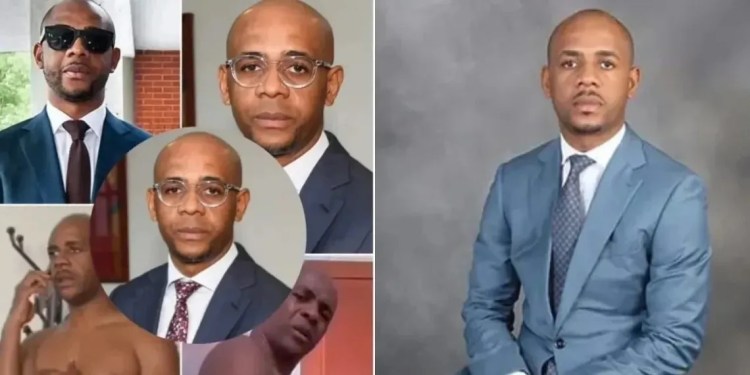The government of Equatorial Guinea has dismissed Baltasar Ebang Engonga as Director General of the National Financial Investigation Agency (ANIF) after widely circulated sex videos involving him and numerous women surfaced online.
Engonga was sacked following the leak of over 400 alleged sex tapes of him in intimate situations with multiple women, some linked to high-profile figures in Equatorial Guinea.
Real Equatorial Guinea reported that President Teodoro Obiang Nguema Mbasogo ordered the dismissal of Mr Engonga, the son of Baltasar Engonga Edjo, current president of the Economic and Monetary Community of Central Africa (CEMAC).
The newspaper added that according to Decree No. 118/2024, dated 4 November, the dismissal cites Mr Engonga’s alleged misconduct in office, alongside family and social behaviour deemed incompatible with public office.
Reacting to the development, First Lady of Equatorial Guinea Constancia Mangue Obiang expressed outrage over the scandal during a meeting with Prime Minister Manuel Osa Nsue, who oversees administrative coordination.
In a statement posted on Facebook Wednesday, the First Lady Press Office (Ofiprensa Primera Dama) announced that Mrs Obiang called for immediate government intervention to uphold the dignity of Equatoguinean women and protect their privacy in the digital age.
She stressed that while the government has advanced gender equality, proactive measures are essential—not only to respond to incidents like these but also to prevent them—to ensure a safe and respectful environment for all women.
Prime Minister Osa Nsue also acknowledged the situation’s impact and emphasised the importance of measures safeguarding individual privacy and the nation’s public image.
He further noted that the government is contemplating stricter privacy laws as it grapples with the scandal’s impact on the nation’s public image and gender equality initiatives.
Recognising the issue, he mentioned that his office actively seeks ways to control it and draw lessons from these mistakes to prevent similar incidents from affecting society.
“The Government of Equatorial Guinea, aware of the impact of social media and the growing presence of private content on digital platforms, is also considering strengthening laws related to privacy and personal data protection to prevent further violations of citizens’ rights.
“The case of Baltasar Ebang Engonga has sparked a broader discussion on the boundaries of privacy in the digital age and the role of institutions in protecting individuals’ fundamental rights. In this regard, the government emphasised the need for a comprehensive approach combining legislation, education, and social awareness to curb the proliferation of inappropriate online content,” said Mr Osa Nsue.
The First Lady and the Prime Minister ended the meeting with a shared commitment to collaboratively implement measures to restore public trust in institutions and safeguard the reputation of Equatoguinean women from similar incidents in the future.
They explored potential strategies to prevent such situations from reoccurring.
Meanwhile, Vice President Teodoro Nguema Obiang Mangue directed the country’s telecommunications ministry, regulator, and telecommunications companies to curb the distribution of pornographic videos.
He emphasised that the government cannot continue to allow families to be harmed by the viral circulation of the 54-year-old economist’s video.
Ahora EG, a local news platform in the country, reported that the government imposed restrictions on citizens, preventing them from downloading and sharing multimedia files over mobile data on WhatsApp.
This action followed government guidelines urging telecommunications operators to limit access to inappropriate content.
Ahora EG also reported widespread frustration among citizens, who could not share photos, videos, or audio over mobile data, forcing them to rely solely on WiFi connections for such exchanges.
A state television station in the country, TVGE, reported Mr Engonga’s sex tapes were leaked when he was remanded in custody at Malabo’s infamous Black Beach prison over an embezzlement of public funds.
Meanwhile, Equatorial Guinea’s chief prosecutor, Anatolio Nzang Nguema, assured the people that if medical tests confirmed the economist had a sexually transmitted disease, he would face prosecution for endangering ‘public health.’
The Vice President ordered an investigation to clarify the facts and hold offenders involved in the viral video accountable.
He also announced that the government would install surveillance cameras in all state agency offices.
Mr Nguema explained that this initiative supports ongoing efforts to enforce public service laws and curb official misconduct.
He added that it aims to strengthen law enforcement, enhance accountability, and underscore the administration’s commitment to integrity amid rising demands for governance reform.
He said, “The government will soon install surveillance cameras in all state agency offices. We have taken this step to ensure compliance with civil service laws and eradicate improper and illegal behaviour.
“We will not tolerate any actions that tarnish the integrity of our administration, and individuals involved in such practices will face strict measures.”
The vice president also declared a ban on sexual relations in the office, warning that any officer caught engaging in such behaviour would face termination.
He further emphasised that control mechanisms have been implemented, stating, “Anyone who fails to adhere to this rule will undergo disciplinary proceedings for misconduct and be dismissed from their position.
“The ministries are solely and exclusively for carrying out administrative tasks in favour of the country’s development. It is forbidden to have sexual relations in offices.”










More Stories
Truck skids off Pen Cinema Bridge in Lagos, lands on 2 commercial buses
Many UTME candidates feared killed In Oyo-Ogbomoso road crash
Trump worries Putin may be playing him, does not want end to Ukraine/Russia war